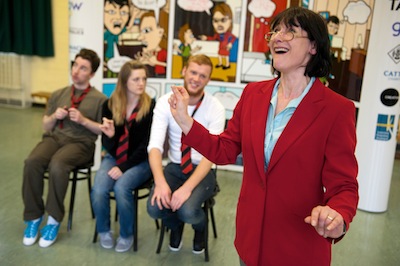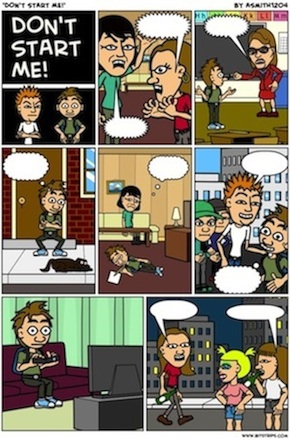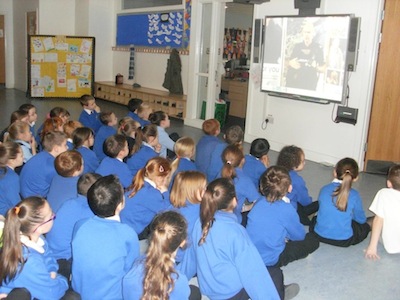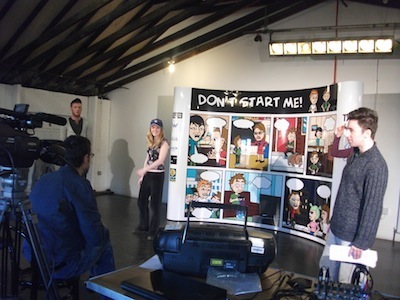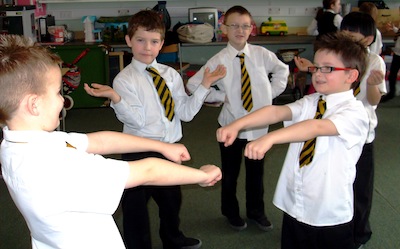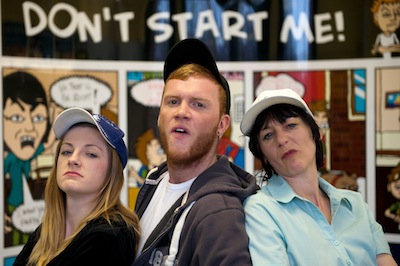 ABOUT
ABOUT
TAG worked in partnership with Strathclyde Police to deliver a multi-artform interactive project in 19 different Glasgow primary schools. The project explored the origins of violent and criminal behaviour and was aimed at P3 and P4 pupils. The children saw a live professional theatre production, took part in drama workshops and took a ‘behind the scenes’ look at how a play is made by taking part in live web conferencing, direct from their classrooms into the Citizens Theatre.
In the play, Don’t Start Me!, a 9 year old boy, Craig gets involved with his older cousin Johnny’s gang, resulting in serious consequences for Craig and his classmates. Prior to seeing the play in their schools, pupils and teachers became familiar with the play and its characters through the project Glow group, which contains a body of teaching resources for pre and post performance activities complete with CfE Experiences and Outcomes for teachers.
Pupils were invited to find out about Craig, his mum Sandra, his sister Jamie Lee and cousin Johnny by reading character cards for each of them. They created their own character card and comic strips depicting a scenario from Craig’s story and shared them via Glow.
Through Glow Meet, children were able to watch a rehearsal and meet the actors and director of the play, and they also met PC Geoff Smith, an officer from Strathclyde Police, to talk about issues raised by the play.
Click here to watch 5 minute video
THE PROJECT INVOLVED
TAG, Citizens Theatre
19 primary schools in the Southside and East End of Glasgow
2 classes in each school – P3 and P4
1004 pupils
44 teachers
PARTNERS
Strathclyde Police
Glasgow local authority
PURPOSE
The project aimed to:
- explore the origins of violent and criminal behaviour;
- educate young children in the choices open to them if they find themselves in difficult social situations;
- break down barriers between the local community and the police;
- develop pupils’ and teachers’ awareness of Glow and ability to use Glow
CURRICULUM AREAS
Expressive Arts
Health and Wellbeing
Social Studies
Technologies
Religious and Moral Education
LEVELS AND STAGES
P3 and P4
TYPES OF LEARNING
The project involved pupils in group work, active learning, interdisciplinary working and learning outside the classroom
There were many strands to the project, including:
- each school saw a live theatre production of a new play, ‘Don’t Start Me!’, which explored the origins of violent and criminal behaviour;
- each class participated in a professionally led post-show drama workshop;
- online resources (via Glow group) available for teachers to access (pre and post show);
- a number of Glow Meets taking place during the project – including a ‘behind the scenes’ glimpse of the rehearsal process, interview with the director and actors, and with a policeman from Strathclyde Police;
- video clips for the pupils and teachers to access and use during lessons
- four CPD training sessions to prepare the teachers for using Glow
- a film maker worked with four ‘Key Schools’ to film feedback and pieces of drama that the children prepared in response to seeing the play;
- online discussions and sharing of information between the teachers involved;
- TAG worked with the Young Women’s Project in Bridgeton, Glasgow. 6 sessions took place whereby TAG tutors worked with the young women and a film-maker to create video clips for the Glow group.
HOW WAS GLOW USED?
Glow was an integral part of every stage of the project:
- Glow Meets held with the actors/director in the play and a Police Officer;
- TAG posted teaching resources, tasks and video clips of the play for teachers to access and use with their classes;
- Pupils and teachers documented the progress of the project using the Glow group picture gallery and discussion board
IMPACTS
An independent evaluation was carried out by Blake Stevenson. Their research shows that the project had the following impacts:
New skills, knowledge and approaches for teachers
- using drama more effectively in the classroom
- increased confidence in using creative methods in teaching, particularly for challenging subject areas.
- training in and experience of Glow
- recognising the value of working with arts specialists.
New skills and knowledge acquisition for pupils
The project promoted the following key learning:
- awareness of choices and consequences, and the problem of peer pressure;
- an understanding of the risks of joining a gang, and the origins of violent and criminal behaviour; and
- awareness of the role of the police
- knowledge and experience of Glow and Glow Meet
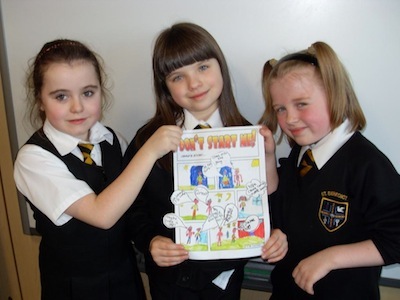 The project supported pupils to achieve progress in the following ways:
The project supported pupils to achieve progress in the following ways:
- Successful Learners – during the work of the project pupils were enthusiastic learners, and became open to new thinking and ideas about gangs, peer pressure and decision making. Pupils became better at communicating, thinking independently and making reasoned evaluations.
- Responsible Citizens – as a result of the project pupils learned to respect others, make informed choices and decisions, evaluate environmental issues and developed informed and ethical views of complex issues.
- Confident individuals – the project increased pupils’ self-respect, and their sense of emotional and mental well-being and helped them to have more secure values and beliefs. Pupils became better able to relate to others and manage themselves, be self-aware, develop and communicate their own beliefs and view of the world and assess risk and make informed decisions.
- Effective contributors – the project supported pupils to develop resilience and self-reliance, and increased their ability to work in partnership and in teams, communicate in different ways and in different settings, apply critical thinking in new contexts, create and develop and solve problems.
New skills and knowledge for TAG
- TAG noted the value of being able to do pre/post visit activities with the pupils, as this prepared them for the performance, increased engagement and meant pupils got more out of the whole experience.
- Staff felt the main benefits of the project were that they had been able to deliver live performance in schools and learn about Glow.
- TAG developed new relationships with Glasgow schools, and strengthened their existing relationship with Strathclyde Police.
Technical and Practical Challenges:
Project timescales slipped slightly due to the adverse weather conditions in Scotland in December 2010. Sessions were rearranged with minimal disruption.
Glow was new to everyone involved in the project which was challenging for teachers who had limited time to learn (and to take on the project as a whole). However, the project provided an exciting incentive for all to learn how to use it and most participants are keen to use Glow again in the future.
Some schools did not have all the equipment to make the most out of Glow Meets (web cam, mic) others experienced technical problems during Glow Meets such as poor sound and image quality.
TAG suggested that more experienced Glow users may have made greater use of Glow (e.g. discussions, forums, evidencing work) and that the Glow group had perhaps not been as interactive as it could have been. In addition, Glasgow pupils had not yet been issued with Glow accounts; they were keen receive logins having experienced Glow through the project.
KEY LEARNING
The project had a large impact on the pupils taking part. They were really engaged by the delivery method, learned about issues relevant to their lives (particularly around gangs, violence and peer pressure), which teachers suggested there was a real need for, and were encouraged to be able to make good decisions.
The project also enabled young people to speak with a local police officer, and learn that the police are there to help them, which may help to improved relations between young people and the police locally.
The project was successful in encouraging some teachers to think more creatively about teaching, and it encouraged some of them to consider how they could use drama more in their teaching practice.
TAG felt that the work done on the Glow group was also a really successful element of the project, as it left a resource that can be used by other teachers and schools in future, and it encouraged some pupils and teachers to use Glow more.
Another positive aspect of the project was that teachers were able to get as much out of it as they wanted, with plenty of additional work suggested by the arts organisation, but with room for teachers to expand on/adapt this where they wished.
Staff in one school suggested that if you want to encourage teachers to start using Glow, it is a good idea to try to engage them with their passion, on a topic they are interested in, for example drama (as this project did). They felt this was the best route to encouraging more teachers to start using Glow.
FUNDING
Co-Create was funded through a partnership between Learning and Teaching Scotland and Creative Scotland’s National Lottery Fund.
For more information contact:
Angela Smith, TAG, angela.smith@citz.co.uk

